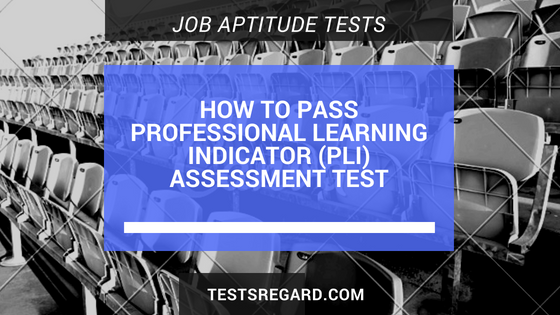Surefire Hints To Blast Your Next Logical Reasoning Test
Logical reasoning test is used by certain companies and organisations as a part of their job aptitude tests or scholarship exams along with other types of tests and exercises. Some job positions in these organisations require employees to have excellent logical judgment and decision-making skills to tackle various work situations. Logical Reasoning tests evaluate candidates’ ability at skills such as interpretation of patterns, number sequences or the relationships between shapes.
How Logical Reasoning is Different From Verbal and Numerical Reasoning
While verbal reasoning tests ask candidates to say if a statement following on from a short passage is true, false, or impossible to tell. Numerical reasoning tests are all about strange mathematical juxtapositions. However, logical reasoning tests assess a candidate’s ability to use structured thinking to deduce from a short passage which of a number of statements is the most accurate response to a posed question. We have logical reasoning tips and tricks for you, read on.
Types Of Logical Reasoning Tests
1. Inductive reasoning tests
2. Deductive reasoning tests
Deductive reasoning is a logical process in which a conclusion is based on the concordance of multiple premises that are generally assumed to be true. Deductive reasoning is a type of reasoning which goes from general to specific. Deductive reasoning is based on premises and if the premises are true, then the reasoning will be valid.
3. Abstract reasoning tests
Also known as conceptual reasoning tests, these measure your ability to think laterally. The better you can identify relationships, patterns and trends, the more successful you’ll be. You’ll be given a series of images that follow a logical sequence or underlying rule and may need to build on that rule, identify a code or find a missing diagram.
4. Diagrammatic reasoning tests
For this specific form of logical reasoning, tests typically show a sequence of diagrams and symbols, sometimes with an input and an output. They assess your ability to identify the rules that apply to the sequence and then use them to pick an appropriate answer.
4. Critical thinking tests
Usually verbal, these measure your logical reasoning skills by seeing how well you can analyse arguments, make inferences and evaluate conclusions.
5 Tricks And Tips To Pass Logical Reasoning Exams
All of these tests assess a specific logical ability or set of abilities. And although they differ in their approach, there are some general strategies you can apply whichever one you might need to take. Here are some tips that will help you know how to answer logical reasoning tests easily.
1. Relax
Yes, logical reasoning tests can be exasperating, especially when you only have so much time to do it. But the calmer you manage to stay, the better your chances of doing well. While a little bit of adrenaline in your system can help you focus and boost your performance, real anxiety can make you freeze up. So, try to stay calm
2. Manage Your Time Wisely
usually, you are given a fixed duration of time to answer all questions. In such circumstances, effective time management becomes a necessity You should divide the time available appropriately for all the questions. Do not spend time on a question that seems difficult, move on to the next. If a test contains questions of varying difficulty, more time should be allocated to the laborious sections while the easier sections should be finished quickly.
3. Read the stimulus thoroughly
Although passages in Reading Comprehension talk about concepts and use terminology you won’t need to comprehend fully on an initial read, Logical Reasoning is different. You’ll have to measure every word in both the question stem and the stimulus. Candidates often read too quickly and gloss over details, which causes the majority of errors here.
4. Find the answer first
If you have the habit of analysing answers first then matching them to the given question, you should avoid this because it will only make the question harder and require more time because each and every answer option will have to be compared to the given sequence. Good practice for logical reasoning tests is to figure out the correct answer, sequence or rule before you look at the multiple choice answers. Doing that will help you pick out the right answer quickly. If you look at the answers first, your logical thinking may be skewed there is a chance you’ll be biased towards the one that appears most correct, rather than thinking the answer through logically.
5.Practice
Becoming familiar with the type of test you’ll be taking, experiencing the time limits and learning from your mistakes will build your confidence, calm your nerves and help you perform better on the day. Regularly practising the test may help you recognise your weak and strong areas to improve upon these. We have many logical reasoning practice test questions and answers on our website that you can check out. In addition, if you know which logical abilities the test assesses, you can start honing these skills and demonstrating the particular aptitude the employer is looking for.
-
Scholarships Aptitude Tests Past Questions, Jobs Aptitude Test Questions & Answers
Abstract Reasoning Questions & Answers for Jobs & Scholarships Aptitude Tests
₦500.00This is a perfect compilation of Abstract Reasoning Questions & Answers for Jobs and Scholarship Aptitude tests, that will help you kill that job/scholarship aptitude test with so much ease.
By…Add to cartQuick View











Comments (12)
[…] have previously written on secrets to passing Verbal Reasoning Tests and Logical Reasoning tests. Make sure you check them out as […]
[…] administers a computer-based test which examines job candidates in the sections of General and Logical Critical reasoning, Numerical reasoning, Verbal reasoning, and sometimes Abstract reasoning. Workforce basically tests […]
[…] Surefire Hints To Blast Your Next Logical Reasoning Test […]
[…] Logical Reasoning tests evaluate candidates’ ability at skills such as interpretation of patterns, number sequences or the relationships between shapes. In this test, you must be able to identify a missing pattern in a series of different shapes that you’ll be provided with. Read Surefire Hints On How To Blast Your Next Logical Reasoning Test […]
[…] Similar to GRE and SAT, the GMAT assesses your proficiency in mathematics, verbal and writing. Candidates are given 3 and a half long hours for this test. for the analytical writing part, you’ll be required to write two essays(one is an analysis of an argument and the second is the analysis of an issue). For the math, you’ll be given 37 problem solving and data sufficiency questions with .multiple-choice answers. Time allocated for this part is 75 minutes. The last section contains 41 questions that center on sentence correction, reading comprehension, and verbal reasoning; you have 75 minutes to answer questions in this section. GMAT is different from GRE and SAT in the sense that scoring is cumulative and not split section by section. The analytical writing section does not factor into the final score, which is on a 200-to-800 point scale. I have previously written an article on how to pass verbal reasoning tests, there’s also an article on 8 important tips on how to ace numerical reasoning tests. You should check this out too, surefire hint to pass your next logical reasoning exam. […]
[…] Verbal: An individual’s knowledge of the use of English is being tested here. Read more on Verbal Reasoning Tests. […]
[…] have previously written on Surefire hints to passing Numerical Reasoning Tests and Logical Reasoning tests. Make sure you check them out as […]
[…] Surefire Hints To Blast Your Next Logical Reasoning Test […]
[…] Logical reasoning/spatial: Logical reasoning tests assess a candidate’s ability to use structured thinking to deduce from a short passage which of a number of statements is the most accurate response to a posed question. Also read surefire hints to pass your next logical reasoning exam. […]
[…] Surefire Hints To Blast Your Next Logical Reasoning Test […]
[…] Abstract Reasoning: This is a test which determines how ‘street-smart’ a candidate is. It is used to know how a candidate reasons, not based on what he/she has learned in schools but on how one applies ideas in solving problems. Read surefire hints to pass your next logical reasoning exam. […]
[…] Surefire Hints To Blast Your Next Logical Reasoning Test […]